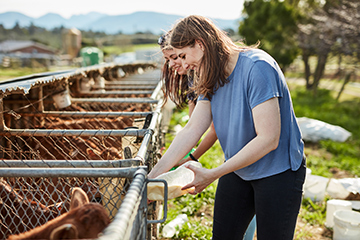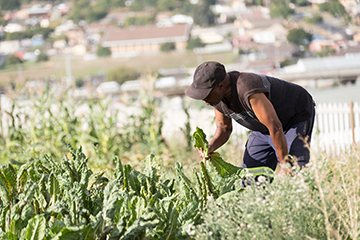Support for small scale farmers - funding opportunity
Agriculture remains one of the largest employers in our country. Small scale and commercial farmers play an important role in our food security and contribute to our country's economic stability. But what happens when land and capital isn't enough to keep the lights burning?

Since 2009, the Department of Agriculture has adopted a commodity approach through the Comprehensive Agricultural Support Programme (CASP) - a national governmental initiative that aims to support provincial departments of agriculture (PDAs) to create a favourable environment for emerging farmers and to expand the provision of support services for the development of agriculture.
CASP is currently being administered under the Farmer Support and Development Directorate of the Western Cape Department of Agriculture, in association with CASIDRA, its governmental implementation partner to ensure that farmers are empowered to effectively manage their farming enterprises.
The CASP is based on the following principles:
- Priority is given to value chains as identified in the Agriculture Policy Action Plan (APAP).
- Full utilisation of partnerships in order to exploit the strengths of key private sector partners.
- Support for land reform projects.
- Access to markets and potential for job creation.
- Provide a comprehensive support package to farmers.
- Mentorship support to small holder farmers.
Funding for this year's CASP applications is officially open! Small scale and commercial farmers who meet the requirements are encouraged to apply for this opportunity before 31 July 2019.
Criteria for applications
To ensure faster and more efficient service, applicants are advised to follow the process detailed below. If you meet the requirements, visit your local Department of Agriculture office to complete and submit your application form.
Subsistence farmers: Community and household projects 
- Production is mainly for own consumption, while the surplus is sold for sustainability purposes.
- Applicants must have access to land (owned or leased).
- In the case of leased land, you must have a lease arrangement of no less than 5 years.
- Applicants must have access to water.
- The household will be sourced from municipal indigent registers.
Smallholder and commercial farmers
- Applicants must have access to land (owned or leased).
- In the case of leased land, the applicant must have a lease arrangement for not less than 9 year-11 months. A longer lease period is required for long term crops.
- The farm must be a land reform project.
- The farm must have the potential to create jobs.
- The farm must contribute to the transformation of the agricultural sector.
- Agri processing project initiatives will be considered.
How to apply
If you're interested in applying for this funding opportunity, you can get a request form from your local Department of Agriculture office. Remember to complete and submit the form within the required time frame together with your tax clearance certificate, security of tenure documentation (copy of title deed or lease contract). All forms must be submitted to your local office for processing with the commodity structures – Commodity Project Allocation Committees (CPAC’s). Once the application is received the Department will get in touch with you and advice you on the further steps.
Conditions of application
Once the project is approved you'll be expected to enter into a contract with the Department of Agriculture / Agent committing to:
- Ensuring effective and productive usage of all equipment and inputs (equipment may be removed if not used productively/misused)
- Accessing the project’s financial records.
- Ensuring access to the premises for site visits from Departmental officials and implementing agents.
- The conditions for the Department to exit the project.
- Compulsory attendance of project meetings.
- The project training plan.
- Compulsory attendance of training offered.
- Successful applicants’ voluntary support with struggling projects.
For more information on the application process, contact your local Department of Agriculture office.
|
No. |
District |
Contact Person |
Address |
Office |
|
Fax |
|
1 |
Little Karoo District |
Willem Burger |
Oudtshoorn Experimental Farm, Old Kammanasie Road, Oudtshoorn, 6620 |
044-272 6077 |
044 279 1910 |
|
|
2 |
Central Karoo District |
Frederick Mpona |
Peter Jacobs Avenue 104, Beaufort West, 6970
|
023-414 3134 |
023 414 2385 |
|
|
3 |
North West Coast District |
Marius Du Randt |
PO Box 130, Vredendal, 8160 |
027-213 2000 |
|
027 213 2712 |
|
4 |
Cape Metropole District |
Phumlani Mentani |
No. 2 Old Paarl Road, 11th Floor, 22 Sunbel Building, Bellville,7530
|
021-948 6966 |
021 948 4729
|
|
|
5 |
Overberg District |
Hennis Germishuys |
Albert Myberg Hostel, Golf Street, Bredasdorp, 7280
|
028-424 1439 |
028 424 2856 |
|
|
6 |
Cape Winelands District |
Dikeledi Kunene |
ABSA BUILDING, 4th Floor, Plein Street, Stellenbosch, 7600
|
021-883 2560 |
021 883 2562 |
|
|
7 |
Garden Route District |
Clyde Lamberts |
2nd Floor York Building, York Street, George, 6530 |
044-803 3757 |
|
044 803 3734 |
|
8 |
Swartland District |
Rose Horne |
Lang Street 42, Moorreesburg, 7310 |
022-433 2330 |
022 433 2102 |
All applicants are required to declare previous government support and failure to do so will lead to disqualification of the applicant.
Civil servants and those working for parastatals are excluded from the support listed above.


